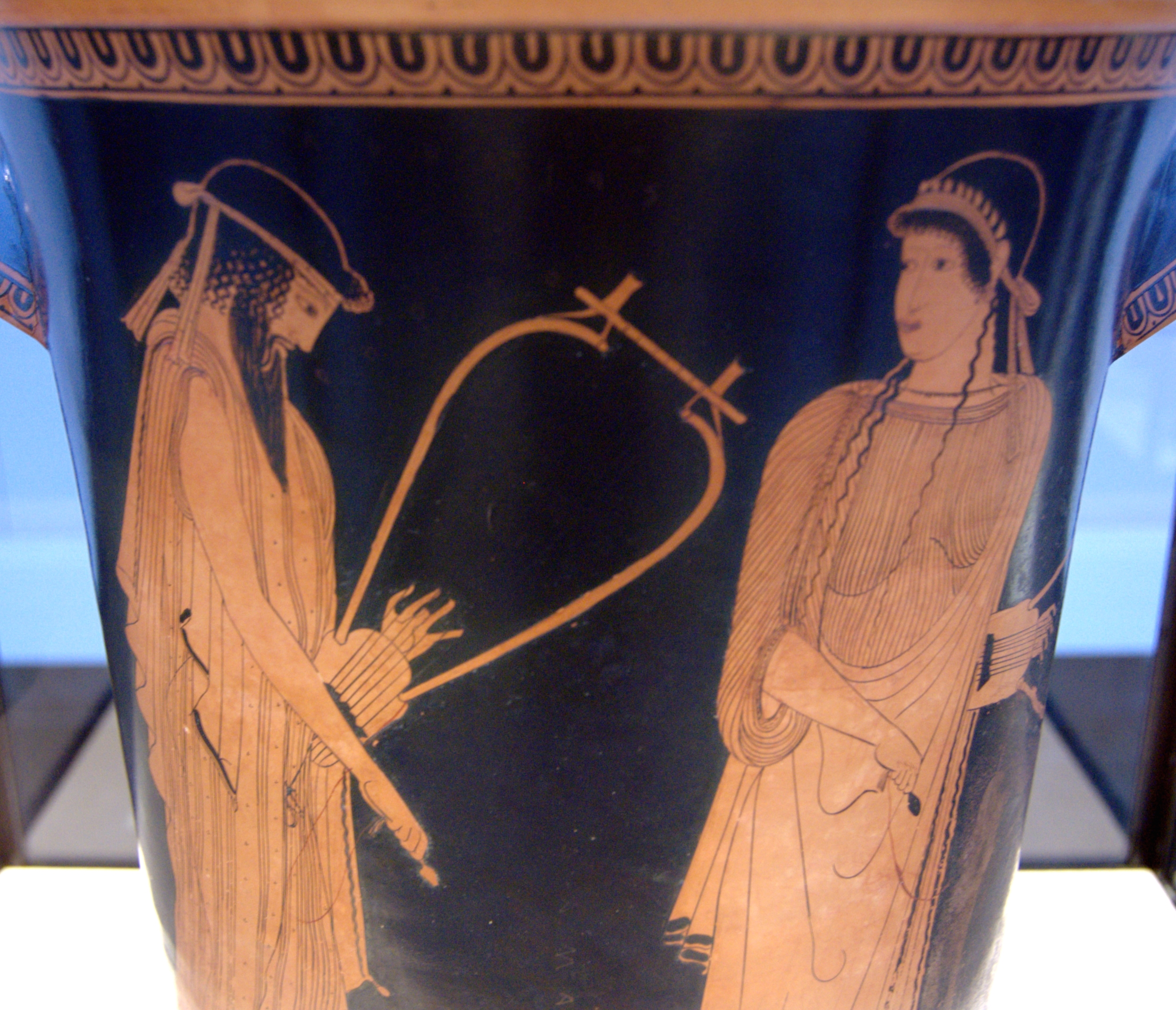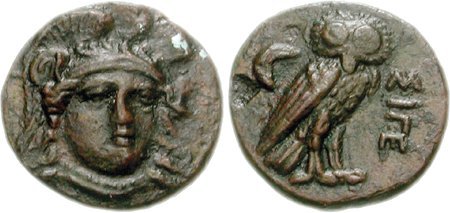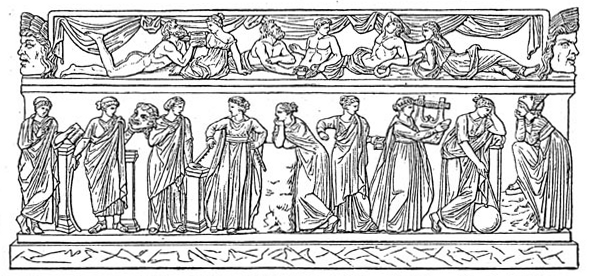|
Alcaeus Of Mytilene
Alcaeus of Mytilene (; grc, Ἀλκαῖος ὁ Μυτιληναῖος, ''Alkaios ho Mutilēnaios''; – BC) was a lyric poet from the Greek island of Lesbos who is credited with inventing the Alcaic stanza. He was included in the canonical list of nine lyric poets by the scholars of Hellenistic Alexandria. He was a contemporary of Sappho, with whom he may have exchanged poems. He was born into the aristocratic governing class of Mytilene, the main city of Lesbos, where he was involved in political disputes and feuds. Biography The broad outlines of the poet's life are well known. He was born into the aristocratic, warrior class that dominated Mytilene, the strongest city-state on the island of Lesbos and, by the end of the seventh century BC, the most influential of all the North Aegean Greek cities, with a strong navy and colonies securing its trade-routes in the Hellespont. The city had long been ruled by kings born to the Penthilid clan but, during the poet's ... [...More Info...] [...Related Items...] OR: [Wikipedia] [Google] [Baidu] |
Alkaios Sappho Staatliche Antikensammlungen 2416 N1
Alcaeus may refer to: * Alcaeus (bug), a genus of stink bugs or shield bugs * Alcaeus (comic poet), a writer of ten plays of the Old Comedy * Alcaeus (mythology), one of several figures of this name in Greek mythology * 12607 Alcaeus, a main belt asteroid * Alcaeus of Messene, a Greek epigrammatist of the late 3rd/early 2nd century BC * Alcaeus of Mytilene Alcaeus of Mytilene (; grc, Ἀλκαῖος ὁ Μυτιληναῖος, ''Alkaios ho Mutilēnaios''; – BC) was a lyric poet from the Greek island of Lesbos who is credited with inventing the Alcaic stanza. He was included in the canoni ..., a lyric poet of the archaic period * Alcaeus and Philiscus (2nd-century BC), two Epicurean philosophers expelled from Rome in either 173 BC or 154 BC {{disambig ... [...More Info...] [...Related Items...] OR: [Wikipedia] [Google] [Baidu] |
Sigeion
Sigeion ( Ancient Greek: , ''Sigeion''; Latin: ''Sigeum'') was an ancient Greek city in the north-west of the Troad region of Anatolia located at the mouth of the Scamander (the modern Karamenderes River). Sigeion commanded a ridge between the Aegean Sea and the Scamander which is now known as Yenişehir and is a part of the Çanakkale district in Çanakkale province, Turkey. The surrounding region was referred to as the Sigean Promonotory, which was frequently used as a point of reference by ancient geographers since it marked the mouth of the Hellespont. The outline of this promontory is no longer visible due to the alluvial activity of the Karamenderes which has filled in the embayment east of Yenişehir. The name 'Sigeion' means 'silent place' and is derived from Ancient Greek (''sigē''), 'silence'; in Classical Antiquity, the name was assumed to be antiphrastic, i.e. indicating a characteristic of the place contrary to reality, since the seas in this region are ... [...More Info...] [...Related Items...] OR: [Wikipedia] [Google] [Baidu] |
Anacreon
Anacreon (; grc-gre, Ἀνακρέων ὁ Τήϊος; BC) was a Greek lyric poet, notable for his drinking songs and erotic poems. Later Greeks included him in the canonical list of Nine Lyric Poets. Anacreon wrote all of his poetry in the ancient Ionic dialect. Like all early lyric poetry, it was composed to be sung or recited to the accompaniment of music, usually the lyre. Anacreon's poetry touched on universal themes of love, infatuation, disappointment, revelry, parties, festivals and the observations of everyday people and life. Life Anacreon was born around 582 BC at Teos, an Ionian city on the coast of Asia Minor. The name and identity of his father is a matter of dispute, with different authorities naming four possibilities: Scythianus, Eumelus, Parthenius, or Aristocritus. It is likely that Anacreon fled into exile with most of his fellow-townsmen who sailed to Thrace when their homeland was attacked by the Persians. There they founded a colony at Abdera, r ... [...More Info...] [...Related Items...] OR: [Wikipedia] [Google] [Baidu] |
Longinus (literature)
''On the Sublime'' (Greek: Περì Ὕψους Perì Hýpsous; Latin: ''De sublimitate'') is a Roman-era Greek work of literary criticism dated to the 1st century- C.E.. Its author is unknown, but is conventionally referred to as Longinus (; grc, Λογγῖνος ''Longĩnos'') or Pseudo-Longinus. It is regarded as a classic work on aesthetics and the effects of good writing. The treatise highlights examples of good and bad writing from the previous millennium, focusing particularly on what may lead to the sublime. Authorship The author is unknown. In the 10th-century reference manuscript (Parisinus Graecus 2036), the heading reports "Dionysius or Longinus", an ascription by the medieval copyist that was misread as "by Dionysius Longinus." When the manuscript was being prepared for printed publication, the work was initially attributed to Cassius Longinus (c. 213–273 AD). Since the correct translation includes the possibility of an author named "Dionysius", some have att ... [...More Info...] [...Related Items...] OR: [Wikipedia] [Google] [Baidu] |
Quintilian
Marcus Fabius Quintilianus (; 35 – 100 AD) was a Roman educator and rhetorician from Hispania, widely referred to in medieval schools of rhetoric and in Renaissance writing. In English translation, he is usually referred to as Quintilian (), although the alternate spellings of Quintillian and Quinctilian are occasionally seen, the latter in older texts. Life Quintilian was born c. 35 AD in ''Calagurris'' ( Calahorra, La Rioja) in Hispania. His father, a well-educated man, sent him to Rome to study rhetoric early in the reign of Nero. While there, he cultivated a relationship with Domitius Afer, who died in 59. "It had always been the custom … for young men with ambitions in public life to fix upon some older model of their ambition … and regard him as a mentor". Quintilian evidently adopted Afer as his model and listened to him speak and plead cases in the law courts. Afer has been characterized as a more austere, classical, Ciceronian speaker than those common at ... [...More Info...] [...Related Items...] OR: [Wikipedia] [Google] [Baidu] |
Pindar
Pindar (; grc-gre, Πίνδαρος , ; la, Pindarus; ) was an Ancient Greek lyric poet from Thebes. Of the canonical nine lyric poets of ancient Greece, his work is the best preserved. Quintilian wrote, "Of the nine lyric poets, Pindar is by far the greatest, in virtue of his inspired magnificence, the beauty of his thoughts and figures, the rich exuberance of his language and matter, and his rolling flood of eloquence, characteristics which, as Horace rightly held, make him inimitable." His poems can also, however, seem difficult and even peculiar. The Athenian comic playwright Eupolis once remarked that they "are already reduced to silence by the disinclination of the multitude for elegant learning". Some scholars in the modern age also found his poetry perplexing, at least until the 1896 discovery of some poems by his rival Bacchylides; comparisons of their work showed that many of Pindar's idiosyncrasies are typical of archaic genres rather than of only the poet hims ... [...More Info...] [...Related Items...] OR: [Wikipedia] [Google] [Baidu] |
Nine Lyric Poets
The Nine Lyric or Melic Poets were a canonical group of ancient Greek poets esteemed by the scholars of Hellenistic Alexandria as worthy of critical study. In the Palatine Anthology it is said that they established lyric song. They were: *Alcman of Sparta (choral lyric, 7th century BC) * Sappho of Lesbos (monodic lyric, BC) *Alcaeus of Mytilene (monodic lyric, BC) * Anacreon of Teos (monodic lyric, 6th century BC) * Stesichorus of Metauros (choral lyric, 7th century BC) * Ibycus of Rhegium (choral lyric, 6th century BC) * Simonides of Ceos (choral lyric, 6th century BC) * Bacchylides of Ceos (choral lyric, 5th century BC) *Pindar of Thebes (choral lyric, 5th century BC) In most Greek sources the word ''melikos'' (from ''melos'', "song") is used to refer to these poets, but the variant ''lyrikos'' (from ''lyra'', "lyre") became the regular form in both Latin (as ''lyricus'') and in modern languages. The ancient scholars defined the genre on the basis of the musical accompanim ... [...More Info...] [...Related Items...] OR: [Wikipedia] [Google] [Baidu] |
Aristarchus Of Samothrace
Aristarchus of Samothrace ( grc-gre, Ἀρίσταρχος ὁ Σαμόθραξ ''Aristarchos o Samothrax''; c. 220 – c. 143 BC) was an ancient Greek grammarian, noted as the most influential of all scholars of Homeric poetry. He was the head librarian of the Library of Alexandria and seems to have succeeded his teacher Aristophanes of Byzantium in that role. Life Aristarchus left the island of Samothrace at a young age and went to Alexandria, where he studied with the director of the library. Later, he was a teacher at the royal courtyard, and then director of the library from 153 to 145 BC. After he was persecuted by his disciple Ptolemy the Benefactor, he found refuge in Cyprus, where he died. It said that Aristarchus had a remarkable memory and was completely indifferent as to his external appearance. Accounts of his death vary, though they agree that it was during the persecutions of Ptolemy VIII of Egypt. One account has him, having contracted an incurable dro ... [...More Info...] [...Related Items...] OR: [Wikipedia] [Google] [Baidu] |
Aristophanes Of Byzantium
__NOTOC__ Aristophanes of Byzantium ( grc-gre, Ἀριστοφάνης ὁ Βυζάντιος ; BC) was a Hellenistic Greek scholar, critic and grammarian Grammarian may refer to: * Alexandrine grammarians, philologists and textual scholars in Hellenistic Alexandria in the 3rd and 2nd centuries BCE * Biblical grammarians, scholars who study the Bible and the Hebrew language * Grammarian (Greco-Roman ..., particularly renowned for his work in Homeric scholarship, but also for work on other classical authors such as Pindar and Hesiod. Born in Byzantium about 257 BC, he soon moved to Alexandria and studied under Zenodotus, Callimachus, and Dionysius Iambus. He succeeded Eratosthenes as head librarian of the Library of Alexandria at the age of sixty. Work Aristophanes was the first to deny that the "Precepts of Chiron" was the work of Hesiod. Inventions Accent system Aristophanes is credited with the invention of the polytonic orthography, accent system used in Greek (la ... [...More Info...] [...Related Items...] OR: [Wikipedia] [Google] [Baidu] |
Sir Lawrence Alma-Tadema, RA, OM - Sappho And Alcaeus - Walters 37159
''Sir'' is a formal honorific address in English for men, derived from Sire in the High Middle Ages. Both are derived from the old French "Sieur" (Lord), brought to England by the French-speaking Normans, and which now exist in French only as part of "Monsieur", with the equivalent "My Lord" in English. Traditionally, as governed by law and custom, Sir is used for men titled as knights, often as members of orders of chivalry, as well as later applied to baronets and other offices. As the female equivalent for knighthood is damehood, the female equivalent term is typically Dame. The wife of a knight or baronet tends to be addressed as Lady, although a few exceptions and interchanges of these uses exist. Additionally, since the late modern period, Sir has been used as a respectful way to address a man of superior social status or military rank. Equivalent terms of address for women are Madam (shortened to Ma'am), in addition to social honorifics such as Mrs, Ms or Miss. ... [...More Info...] [...Related Items...] OR: [Wikipedia] [Google] [Baidu] |
Richard Claverhouse Jebb
Sir Richard Claverhouse Jebb (27 August 1841 – 9 December 1905) was a British classical scholar. Life Jebb was born in Dundee, Scotland. His father Robert was a well-known Irish barrister; his mother was Emily Harriet Horsley, daughter of the Reverend Heneage Horsley, Dean of Brechin. His grandfather Richard Jebb was a judge of the Court of King's Bench (Ireland). His sister was the social reformer Eglantyne Louisa Jebb, founder of the Home Arts and Industries Association; his niece, Eglantyne's daughter Eglantyne Jebb, co-founded the Save the Children Fund and wrote the Declaration of the Rights of the Child. He was educated at St Columba's College, Dublin 1853–55 then Charterhouse School 1855–1858. He then studied Classics at Trinity College, Cambridge. He was a Member of the Cambridge Apostles, the intellectual secret society, from 1859. He won the Porson and Craven scholarships, was senior classic in 1862, and became fellow and tutor of his college in ... [...More Info...] [...Related Items...] OR: [Wikipedia] [Google] [Baidu] |
Stuarts
The House of Stuart, originally spelt Stewart, was a royal house of Scotland, England, Ireland and later Great Britain. The family name comes from the office of High Steward of Scotland, which had been held by the family progenitor Walter fitz Alan (c. 1150). The name Stewart and variations had become established as a family name by the time of his grandson Walter Stewart. The first monarch of the Stewart line was Robert II, whose male-line descendants were kings and queens in Scotland from 1371, and of England and Great Britain from 1603, until 1714. Mary, Queen of Scots, was brought up in France where she adopted the French spelling of the name Stuart. In 1503, James IV married Margaret Tudor, thus linking the royal houses of Scotland and England. Elizabeth I of England died without issue in 1603, and James IV's great-grandson (and Mary's only son) James VI of Scotland succeeded to the thrones of England and Ireland as James I in the Union of the Crowns. The Stuarts wer ... [...More Info...] [...Related Items...] OR: [Wikipedia] [Google] [Baidu] |






